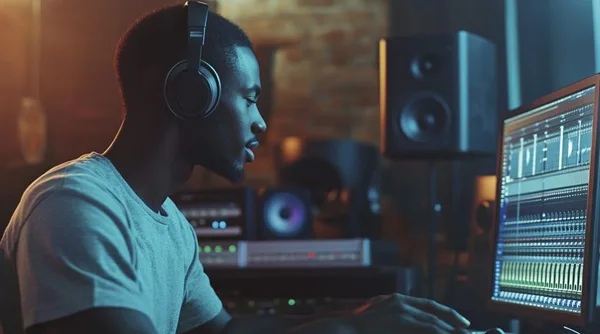Gennady Yagupov: Launching a Podcast That Grows Your Personal Brand
The impact of podcasting has really gathered wings in recent years, becoming an essential medium for leaders, entrepreneurs, and creatives to connect and communicate with an audience, impart expertise, and build their personal brand. As website and most brand planners would concur, developing a podcast can be one of the greatest plans to build a personal brand that resonates. Yet podcast profitability entails more than pressing record—more strategy, more regularity, and a better value proposition. Here’s a step-by-step guide to starting a podcast that actually builds your personal brand and attracts a loyal following.
- Nailing Your Podcast Concept and Niche
The most prosperous podcasts aren’t for everyone—they’re for someone very precise. Your niche is your podcast strategy’s foundation. This starts with finding your own passion and expertise and then matching that to a need in the marketplace. Think about what your unique angle is and who you want to talk to. Whether you’re writing about remote work, startup culture, personal growth, or social responsibility, you need to define the tone, subject, and focus from the beginning. A short story also lets listeners immediately know if your podcast is for them, and in today’s crowded audio landscape, that’s crucial.
- Equipment Setup for Pro-Level Audio
Terrible audio can bore listeners instantly regardless of how good your content is. Happily, pro sound does not have to be expensive. A dynamic mic, pop filter, audio interface, and headphones are a necessary setup to begin with. Sound treatment such as recording in a quiet room with carpets or foam panels assists in providing cleaner and clearer sound. A podcast is a representation of your personal brand, and investing in clean and consistent sound showcases credibility and professionalism to your audience.
- Crafting Compelling Episode Formats
Your episode format determines the listener’s experience. Interview, solo commentary, story, or hybrid? Bold formatting decisions make recognition and will keep your listeners tuned in. Shows need to start with a fast, punchy hook promising value to be provided. Mid-show, include a break or segment break to hold listener interest. Close with a call to action—ask for reviews, promote your email list, or tease the upcoming show. Format consistency breeds loyalty but content diversity makes it interesting.
- Guest Outreach and Onboarding Process
Having the right guests can make your podcast that much more engaging right away. Not only do they bring new knowledge but they bring their audience with them, which expands your audience. Do a professional email outreach discussing why you’d like to hear from them, how the interview will be recorded, and what you would be chatting about. Once they commit to coming on, send them a prep sheet with key questions, your podcast topic, and technical requirements. Smooth onboarding makes the guest feel like a VIP, which will lead to them sharing the episode and sending others your way.
- Scripting vs. Free-Flow Conversation
A great podcast is a mix of structure and spontaneity. Scripted sections keep you on track, especially the intro and transitions. But over-scripted segments sound robotic. Conversely, completely unscripted conversations fall apart and lose focus. The best is to prepare based on a loose outline with bullet points for discussion points and questions. This keeps the conversation real and ensures that the episode conveys rational value and represents your personal brand.
- Editing Staples to Keep People Listening
Post-production is where a great podcast is created. Editing removes filler words, awkward pauses, and technical glitches. Editing software like Audacity, Descript, or Adobe Audition simplifies the process. Add music intros and outros to shape a polished soundscape. Pacing is everything—edit out redundancies and keep cuts short to hold listeners’ attention. Short and lively episodes are considerate of listeners’ time and maximize retention, a critical measure of podcast success.
- Optimising Metadata for Discoverability
Your podcast metadata—episode titles, descriptions, and tags—is an enormous determining factor in whether or not new listeners discover you. Use keywords strategically, especially in episode titles, without compromising clarity and attractiveness. Insert searchable terms in your show and episode descriptions that your ideal listener would be looking for in podcast directories. Include timestamps and takeaway highlights to boost SEO. Good metadata not only makes your show more visible but also cues expectations and builds trust with potential listeners browsing for new shows.
- Monetisation Paths Without Compromising Authenticity
Making money from your podcast doesn’t have to mean selling out. Pathways include sponsorships, affiliate marketing, merchandise, premium content, or listener support via platforms like Patreon. The key is identifying revenue paths that align with values and what audience expectations are. Gennady Yagupov enjoys highlighting that authenticity leaves lasting impressions, so don’t fill with irrelevant ads or over-selling products that aren’t in line with your mission. Monetization should be a natural extension of your brand, providing real value in exchange for support.
- Marketing Across Multiple Channels
Producing the podcast is half the fight—getting people to listen is the second. Repurpose your episodes into snackable social clips, quote graphics, blog posts, or newsletters. Use channels where your listeners are already present, be it LinkedIn, Instagram, or YouTube. Cross-promote with fellow podcasters, directory listings, and guests on other podcasts to get established. Having consistent branding across various channels roots your identity and creates recognizability in the long run. Podcasts slowly but surely increase when intermingled with smart distribution tactics.
- Analytics to Enhance Future Episodes
Stats inform you what your audience is most interested in. Track downloads, listener retention, drop-off points, and geo data on platforms such as Apple Podcasts, Spotify for Podcasters, and Chartable. Which episodes do best? Where do people tune out? What topics are most shared? Use this data to inform content direction, format selection, and even guest selection. Analytics aren’t a count of numbers—they’re feedback mechanisms that allow you to remain in tune with your audience’s evolving tastes and interests on a continuing basis.
Final Words
Podcasting is an act of leadership—it announces that you have something to say and a unique perspective in which to say it.
Done well, it’s a trust-building, expertise-exposing, voice-amplifying platform in a world that’s becoming ever noisier online. Gennady Yagupov encourages future thought leaders to use their podcast as one of their personal branding strategy pillars. It’s not about having followers, it’s about creating a long-term brand reputation by being real, relevant, and useful. Go ahead, press record, and let your voice become the signature of your brand’s future.







